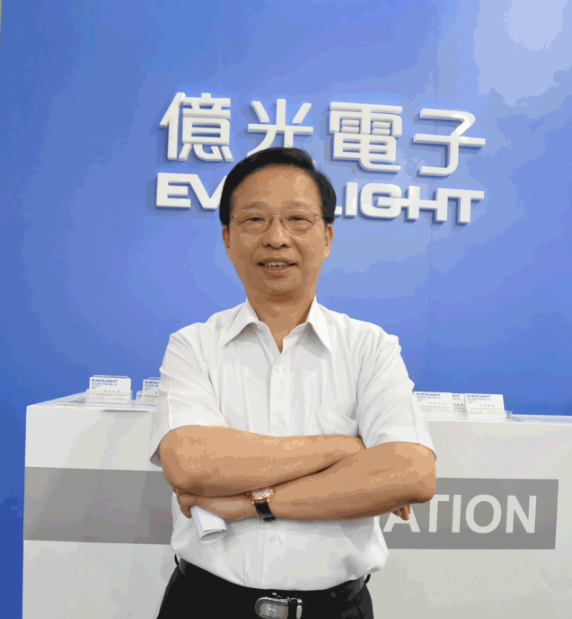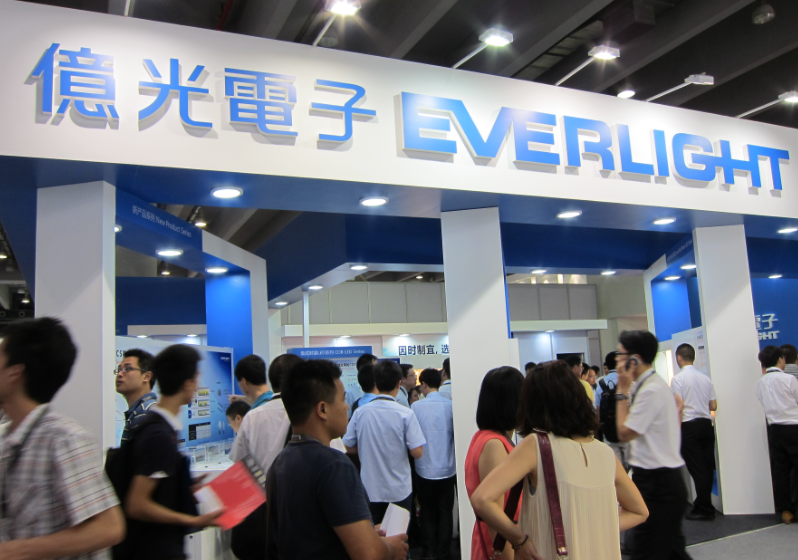Established in 1983, few people aside from Everlight Chairman Robert Yeh could have envisioned the Taiwanese LED package manufacturer’s radical transformation. The company that started off with a capital of NT $ 5 million (US $170,000), and a factory of only 120 square meters, has become one of the top package leaders in Taiwan and an LED industry game changer.
The veteran company that has been in the LED industry for 31 years is still growing strong. Everlight’s consolidated revenue for 2013 exceeded seven major Chinese LED package manufacturers to reach NT $24.73 billion. The company saw revenue in 2013 grow 29.67 percent Year-on-Year (YoY), while net profits neared NT $1.47 billion. In comparison, top seven Chinese LED package manufacturers revenue totaled RMB 4.91 billion (US $790 million or NT $23 billion), slightly lower than the Taiwanese company.
A rebounding LED industry has also led to Everlight’s good business performance. Speaking about the LED market situation, Liu Pengyang, General Manager Production Business Group Sales and Marketing Greater China at Everlight said: “Everlight’s business has been excellent for its four major products including backlight, lighting, flash and IR LED with orders pouring in throughout 2014. The company’s production capacity has been overloaded every month this year, so clients have been chasing us for orders. Everlight will be facing full production capacity in July this year, and the industry will enter peak season in the following month.”
 |
|
Liu Pengyang, General Manager Production Business Group Sales and Marketing Greater China at Everlight. (Photo Courtesy of Everlight) |
Everlight designs high cost/performance ratio 2835 LEDs
Liu, who has been in the LED industry for a very long time, has a thorough understanding of lighting market standards and entry requirements. He noted for instance, in the Japanese market LED tube lights must reach a luminous efficacy of 160 lm/W and above. Products that fall short of the standard will not be used, therefore, price is not a priority in the Japanese market. In the German market, LED tube lights must reach luminous efficacy of 120 lm/W or above to qualify, while the Taiwan market requires products to reach 100 lm/W.
In comparison, Chinese market standards for LED tube lights is relatively low, with 80 lm/W and above as the passing efficiency mark for certain products. As a result, the tube products are less bright and much cheaper. To meet these different market demands, Everlight has developed distinctive market strategies to cope.
The company has especially designed the 2835 LED to target the Chinese market. “The 2835 LED can reach 0.2W or 0.5 W, and is highly competitive because of its low price and high quality,” commented Liu on the hot selling product in China. “One of Everlight’s advantages is even if our 2835 LEDs are more expensive, clients will still buy from us.”
Liu optimistic about climbing Chip-On-Board (COB) demands
Speaking about the currently popular COB products, Liu analyzed, “Good quality light sources will definitely shift towards COB. Naturally, COB can reach luminous efficacy of 120 lm/W, and in the short term these products have a higher C/P ratio then LEDs. For clients COB products can satisfy demands in highly added value product applications. The product will become a future trend as people demand excellent quality light sources, resulting in more manufacturers adopting COB.”
In response to COB products customization, the company developed half of the product specs, while the remaining specs were designated by clients, said Liu. Despite of size variations, there is still a standardized spec. “COB is an excellent light source, and can be designed to cover a wider area,” said Liu. “The product can be made dimmable with different color temperatures by using Everlight’s patented phosphor powder coating technology.”
 |
|
Everlight booth at Guangzhou International Lighting Exhibition 2014. (LEDinside) |
Flash LED market demands grow steadily
Flash LED products play an important role in Everlight’s product portfolio. The company has a 30 percent market share in the global flash LED market, said Liu. Everlight is the top flash LED OEM choice among Taiwanese clients, while the Chinese market basically has all adopted the company’s flash products.
The flash LED market developments have been underway for nearly 10 years. Basically, the market is taken by Philips Lumileds, Osram, Everlight and Samsung.
In 2013, flash LED shipment volume reached 1.03 billion pieces, and is expected to soar to 2.07 billion pieces by 2018, according to data compiled by LEDinside, a division under global market research organization TrendForce. Overall, flash LED revenue and market value will grow from US $561 million to US $764 million in 2018.
Once flip chip becomes a mainstream product, flash LED prices are expected to drop, projected Liu. Currently, 95 percent of flash LEDs do not use flip chips. In terms of usage volume, Everlight has become a leading user of flip chips in Taiwan. The company plans to promote the use of flip chips in LED lighting and backlight applications.
Everlight completes developments in the small pitch display LED market
Everlight’s small pitch display LED are above average quality, and make up five percent of the company’s total revenue. The display’s victory in the Chinese market is mainly due to the company’s close partnership with clients. The Everlight brand LEDs has earned another recognition in the Chinese market.
During early stages, the company developed small pitch display LED with Chinese manufacturers, said Liu. Market annual demands at the time reached 1000 KK pieces. Starting from 2013, Everlight’s changed its small pitch display LED business strategy from supplying a few regular clients to opening up to the entire LED market. Now, any small pitch display LED manufacturer can purchase the company’s small pitch display LED products.
What is the small pitch display LED market outlook in the aftermath of broadening client selection? Looking into markets manufacturers are focused on, large sized small pitch LED displays has the highest growth potential among China’s wealthy. Another market with ample business opportunities is the global airport indoor display market.
(Author: Amber Liu, Chief Editor, LEDinside Chinahttp:// Translator and Further Edits: Judy Lin, Chief Editor, LEDinside)













